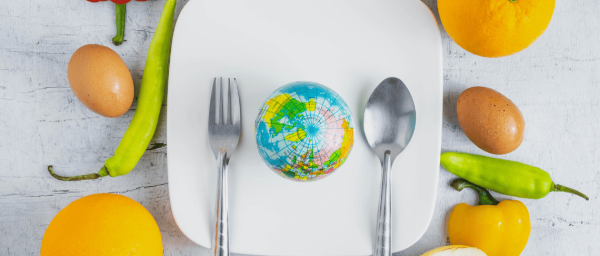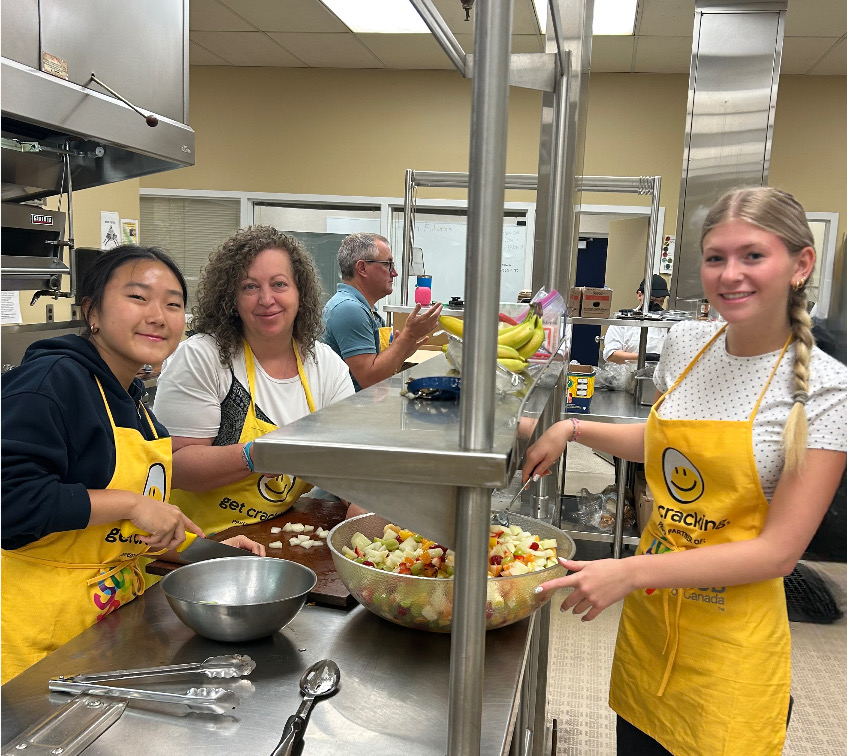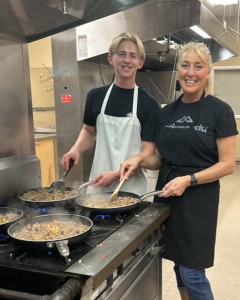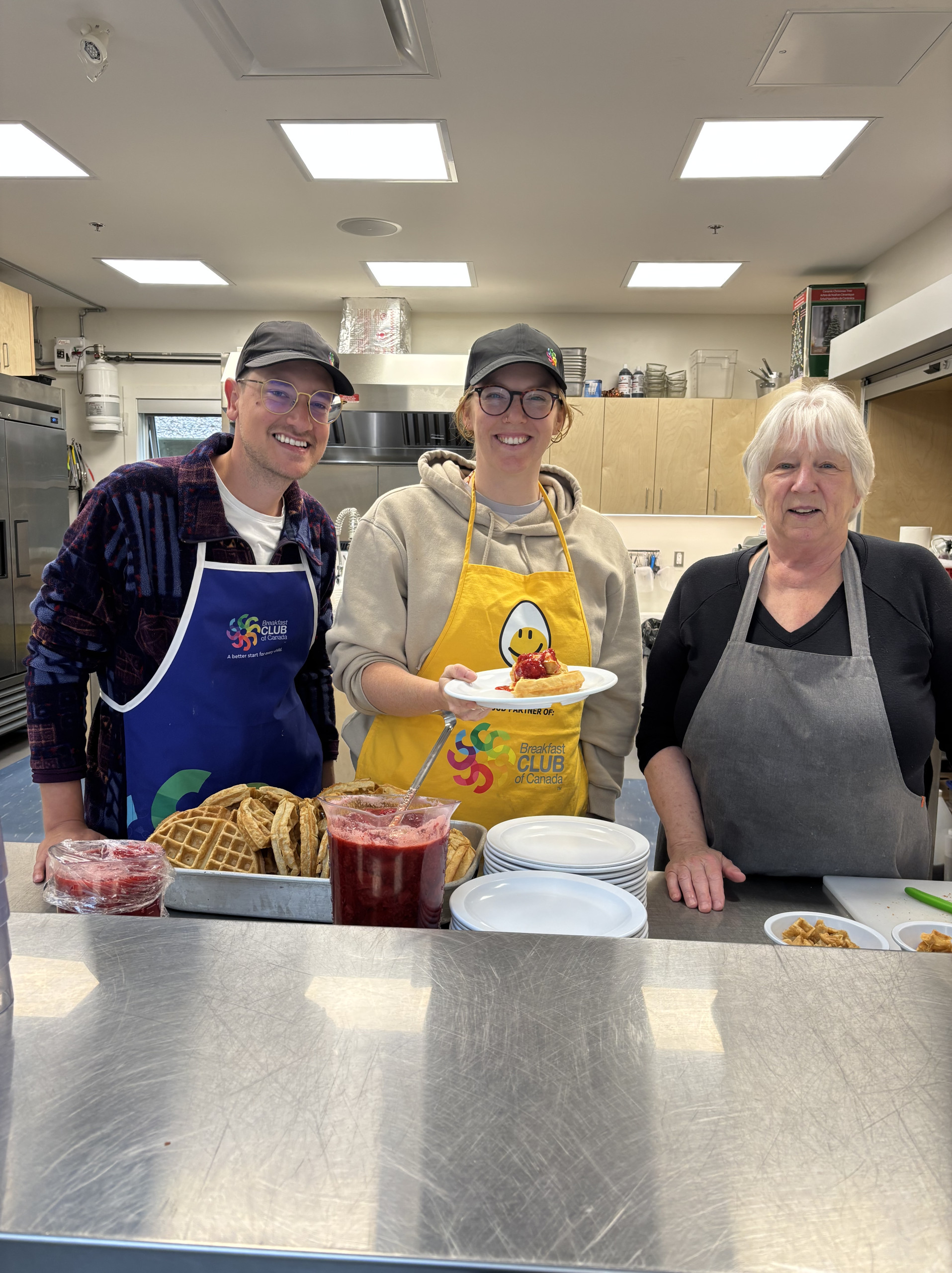
Take Care of Yourself, Take Care of Each Other, Take Care of This Place.

“Take Care of Yourself, Take Care of Each Other, Take Care of This Place” is the school motto at Yale Secondary in Abbotsford, BC. Yale Secondary School is bursting with spirit and teamwork. The school highlights the importance of student leadership and encourages students to make a difference in the world by applying their unique experience (Yale Secondary). There’s no shortage of volunteers, staff and students who are eager to help at the large community breakfasts currently held twice a month. A powerhouse team of three women runs the breakfast program, volunteering their time and hard work every morning to support community connection in a true embodiment of their school motto.
What’s the one thing people need to know about your program?
We have a strong passion for community and a desire for students and staff to enjoy a meal together, stigma-free. Breakfast is all-inclusive—we have small breakfasts available every day and two big breakfasts in our cafeteria each month. It’s such a great way to connect with each other, build relationships and identify areas of support. It’s the ideal way to start the day!
What are you most proud of in your program?
Our ability to come together and work as a team, to support each other and the relationships we build. We are all equal in breakfast—there’s no “teacher” dynamic. It’s a great boost of energy. Sharing a meal as a community is so important; we’re feeding so many kids, and it’s not just access to food that having breakfast together offers, but access to a community as well. And I’m so proud of our volunteers. They give so much of their time to arrive early and be a part of our school meals. This includes administration, students, teachers, support staff—our entire community comes together! Also, LOVE the fruit salad!
In what ways have you engaged students using the breakfast program?
From a practical standpoint, we have student volunteers who come in and help with prepping, cooking, serving and cleaning up. The peer students from our neighbouring home economics class lend a hand with breakfast dishes daily, which is so helpful. And then there’s conversation and trust building … and humour! When we’ve got the music playing, the atmosphere is fun and we all have a good time. We’ve built a community around breakfast.
How would you like to expand your student engagement?
I would love to integrate with the amazing programs we already have at Yale. Use the breakfast club as a tool; it teaches a lot of valuable life skills and opens up work experience opportunities. We have a few students who help with prepping and serving. They’re taking on a leadership role and using it to create a new and more positive path for themselves. It makes a huge difference when students see their peers involved. It’s an opportunity to make connections.
How has your breakfast program affected school spirit and sense of community?
It’s amazing to see our school community eat together, not a phone in sight, just honest connection over a meal. Students really look forward to our big breakfasts. In fact, kids who used to be late for school are now first in line. Food is what keeps them going, and by providing a good breakfast, we’re enhancing their potential for success.
Do you incorporate green initiatives in your program? IF YES, what advice would you give to other schools who have green ambitions?
We try to compost and recycle but we would like to improve our green initiative, like reducing cost and waste by using reusable dishes and cutlery. We’re glad to know that Breakfast Club of Canada can help us with this! It would be a great leadership and work experience opportunity for a student looking to get ahead. We could engage a rotation of students in a restaurant-style dish pit all while reducing our school’s footprint.
What’s the funniest thing you’ve ever heard someone say about your breakfast program?
I’m not sure about the funniest thing, but you can always hear laughter! Marisa has a big Italian voice and takes the lead on our big breakfast, directing people around the kitchen in a way that would make her Nonna proud.
What’s the most significant challenge your program faces and how do you tackle it?
A great problem, but one that is sometimes tricky to navigate, is “Too many cooks in the kitchen.” We work respectfully as a team, and I think our strengths balance each other out well. We’re passionate and sometimes need to rein each other in as we navigate working with different departments. We have many volunteers who come out to support the prep and serving of our big breakfast, but communication isn’t always on point, which means lots of volunteers and the big task of delegating jobs the morning of.
What is one of your goals for the program?
Our passion is to feed everyone quality food, to eat together and connect with one other. It’s so important to have shared meals. When we set aside devices, we can nourish our bodies and each other. I want students to bring this home—to learn to cook and share.











